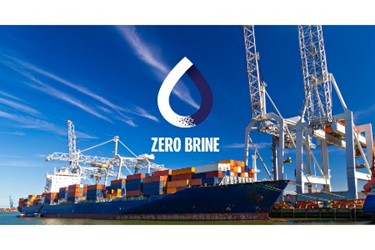Demin Water Pilot Advances Industrial Circularity & Critical Raw Material Recovery

At the Demineralized Water Plant (DWP) of Evides in the Botlek industrial area of Rotterdam port, ZERO BRINE is demonstrating the innovative circular economy concept to treat industrial wastewater through redesigning the current brine treatment process from linear to a circular model recovering all the resources. Business stakeholders of the salt industry and specialized press were present on 23 May 2019, during the first trials of Evides Industriewater’s large demonstration at Plant One Rotterdam - a sustainable tech and innovation test facility.
The Port of Rotterdam is one of the largest petrochemical clusters in Europe where demineralized water, supplied by Evides, is an essential commodity required for the many industrial processing facilities. The pilot aims to cope with increasing salinity of the feed water, supplied by the Brielse Meer, and will use waste heat from nearby factories to eliminate brine effluent while recovering high purity calcium, magnesium, NaCl solution and sulphate salts to recycle the streams back into the site.
Circular processes in industry is essential to develop a sustainable, low carbon, resource efficient, and competitive economy in the EU. Recovering all resources from wastewater enhances preserving resources and security of supply. Magnesium is identified by the European Union (EU) as one of 27 critical raw materials, of which it is currently 100% import-reliant, with China accounting for 94% of all magnesium supplied to the EU.
The quality of the recovered resources will aim to meet local market specifications, providing immense opportunity for the recovery of second-generation resources, including critical raw materials, that minimize the environmental impacts of industrial operations with economic promise for circular business models.
The pilot is developed in the context of the ZERO BRINE project, which aims to facilitate the implementation of the EU Circular Economy package and the Sustainable Process Industry through Resource and Energy Efficiency (SPIRE) Roadmap in various process industries by developing necessary concepts, technological solutions and business models to redesign the value and supply chains of minerals and water while dealing with present organic compounds in a way that allows their subsequent recovery.
Three additional large-scale pilot plants will be developed in other process industries including a coal plant in Poland, a silica plant in Spain, and a textile factory in Turkey, providing the potential for immediate replication and uptake of the project results after its successful completion. In this way, ZERO BRINE encourages industrial circularity for a new generation of innovative, resource-efficient European businesses.
About ZERO BRINE
Coordinated by TU DELFT, the innovation project ZERO BRINE advances circular economy business model solutions to reduce industrial saline wastewater streams by recovering and reusing the minerals and water from the brine in other industries. ZERO BRINE is funded by the European Union’s H2020 Research and Innovation Program and includes 22 partners from research institutes, SMEs, construction companies, and end-users from 10 countries across Europe.
Source: ZERO BRINE
